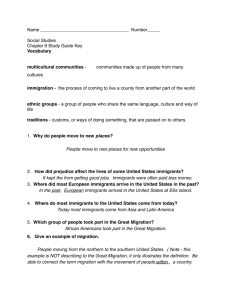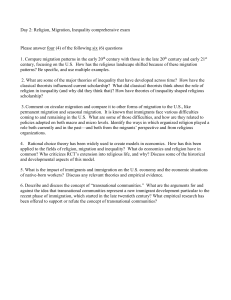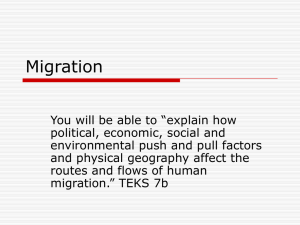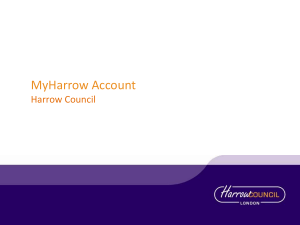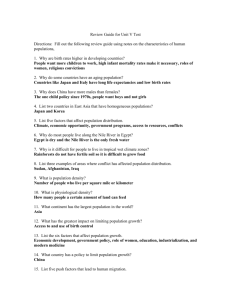NEHGS - Great Migration Begins: Immigrants to New England 1620
advertisement
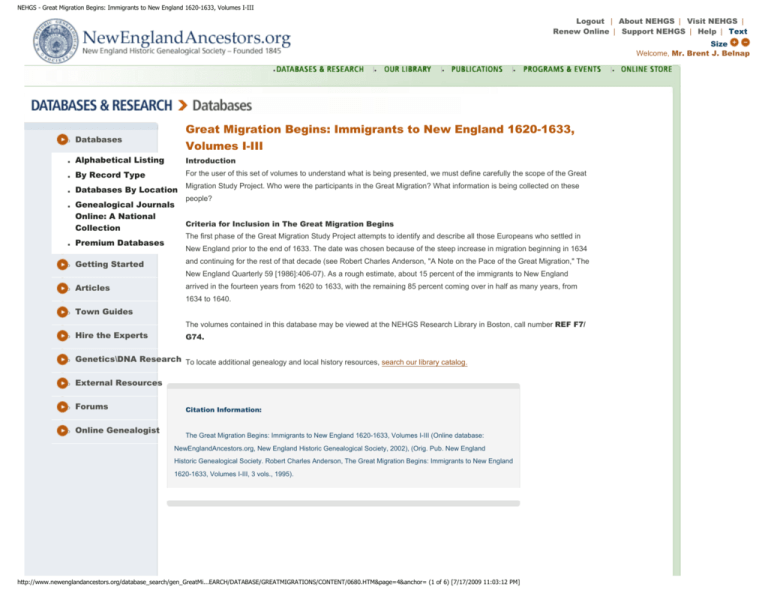
NEHGS - Great Migration Begins: Immigrants to New England 1620-1633, Volumes I-III Logout | About NEHGS | Visit NEHGS | Renew Online | Support NEHGS | Help | Text Size Welcome, Mr. Brent J. Belnap ● ● ● ● Databases Great Migration Begins: Immigrants to New England 1620-1633, Volumes I-III ■ Alphabetical Listing Introduction ■ By Record Type For the user of this set of volumes to understand what is being presented, we must define carefully the scope of the Great ■ Databases By Location Migration Study Project. Who were the participants in the Great Migration? What information is being collected on these Genealogical Journals Online: A National Collection people? Premium Databases The first phase of the Great Migration Study Project attempts to identify and describe all those Europeans who settled in Getting Started and continuing for the rest of that decade (see Robert Charles Anderson, "A Note on the Pace of the Great Migration," The ❍ ■ ■ ❍ Criteria for Inclusion in The Great Migration Begins New England prior to the end of 1633. The date was chosen because of the steep increase in migration beginning in 1634 New England Quarterly 59 [1986]:406-07). As a rough estimate, about 15 percent of the immigrants to New England ❍ Articles arrived in the fourteen years from 1620 to 1633, with the remaining 85 percent coming over in half as many years, from 1634 to 1640. ❍ ❍ ❍ ❍ ❍ ❍ Town Guides Hire the Experts The volumes contained in this database may be viewed at the NEHGS Research Library in Boston, call number REF F7/ G74. Genetics\DNA Research To locate additional genealogy and local history resources, search our library catalog. External Resources Forums Online Genealogist Citation Information: The Great Migration Begins: Immigrants to New England 1620-1633, Volumes I-III (Online database: NewEnglandAncestors.org, New England Historic Genealogical Society, 2002), (Orig. Pub. New England Historic Genealogical Society. Robert Charles Anderson, The Great Migration Begins: Immigrants to New England 1620-1633, Volumes I-III, 3 vols., 1995). http://www.newenglandancestors.org/database_search/gen_GreatMi...EARCH/DATABASE/GREATMIGRATIONS/CONTENT/0680.HTM&page=4&anchor= (1 of 6) [7/17/2009 11:03:12 PM] ● NEHGS - Great Migration Begins: Immigrants to New England 1620-1633, Volumes I-III THOMAS PURCHASE ORIGIN: Dorchester, Dorsetshire MIGRATION: 1630 FIRST RESIDENCE: Pejepscot REMOVES: Lynn 1675 FREEMANSHIP: Plymouth oath of fidelity (at the head of those in the Kennebec region), 23 June 1654 [ PCR 2:58]. EDUCATION: He signed his will. His inventory included "one great Bible & three other books, 16s." OFFICES: Commissioner at Saco, 25 March 1636 [ MPCR 1:1]. Grand jury, 8 September 1640 [ MPCR 1:73]. Plymouth Colony Assistant for Kennebec region, 23 June 1654 [ PCR 3:58]. ESTATE: On 16 June 1632 with his brother-in-law George Way, Thomas Purchase received a grant from the Council for New England for two miles of land adjoining the River "Bishopscotte [Pejepscot]." They signed articles of agreement over two moieties in the property 22 April 1633 [ NEHGR 43:149]. On 22 July 1639 "Thomas Purchase, of Pagiscott, gentleman," deeded to John Winthrop (as agent for the Massachusetts Bay Company) "all that tract of land at Pagiscott aforesaid, upon both sides of the river of Androscoggin, being four miles square towards the sea ... so as they may plant the same with an English colony when they shall see fit" [ MBCR 1:272]. (Judging by later events this transfer of title must not have remained in effect.) On 4 February 1687/8 John Archdale recited the sequence of steps by which this grant had come about, and that he "hath been credibly informed and doth verily belive it to be true that the tenement of the said Thomas Purchase was unfortunately burnt down and destroyed by fire, and that he heard the said Thomas Purchase say that his patent was at that time burnt and destroyed therein"; Archdale believed that despite these events Ferdinando Gorges would have confirmed Purchase's title [ NEHGR 13:303-4]. George Way in his will of 1 October 1641 stated that the "money and provenue of the benefit of my plantation at Beshipscot in New England, which is due to me from my brother-in-law Thomas Purchase" was to go to the rearing of his two daughters and later to be inherited by his son [ Waters 310-12, citing PCC 155 Evelyn]. Eleazer Way, heir and only son of George Way, sued Thomas Purchase on 10 October 1657 and on 1 June 1669 agreed to the sale of the plantation in order to receive his share, calling Purchase "my dear and honored uncle Mr. Thomas Purchase of Pudgipscott" [ NEHGR 43:149; MBCR 4:1:334]. On 25 October 1683 "John Blany of Lynn ... & Elizabeth his wife, the late relict & administratrix of Thomas Purchase of Pejepscot," after reciting the history of the grant of Pejepscot to George Way and Thomas Purchase and noting that "Eliazer Way, the son & heir of the said George Way, hath granted & sold unto Richard Wharton of Boston ..., merchant, all his moiety, part or share in the said patent," sell to Richard Wharton of Boston "with the free and full consent of all the children of the said Thomas Purchase ... all that moiety, half deal & remaining share whatsoever the same is or may be of the said lands late belonging to the said Thomas Purchase" [ YLR 4:16-17]. On 10 January 1683[/4] "Elizabeth Purchase the relict of Thomas Purchase Junior deceased, & Oliver Ellkine & Jane his wife, the daughter of Thomas Purchase Senior deceased, & Elizabeth Blany daughter of the said Thomas Purchase Senior" consented to this deed [ YLR 4:17]. On 7 July 1684 several sagamores of central coastal Maine confirmed to Richard Wharton large parcels of land, including the land that had been occupied "near three score years since [by] Mr. Thomas Purchase deceased" [ YLR 4:14-16]. Aspinwall copied a bill from Thomas Purchase to Valentine Hill for three-eighths of the Blessing dated 29 October 1644 [ Aspinwall 1]. In his will, dated 2 May 1677 and proved but set aside 25 June 1678, "Thomas Purchase Senior ... being http://www.newenglandancestors.org/database_search/gen_GreatMi...EARCH/DATABASE/GREATMIGRATIONS/CONTENT/0680.HTM&page=4&anchor= (2 of 6) [7/17/2009 11:03:12 PM] NEHGS - Great Migration Begins: Immigrants to New England 1620-1633, Volumes I-III now in good health" bequeathed to "my well beloved wife Elizabeth Purchase" one-third part of all my goods chattels, houses and lands (if any standing); to "my five children equally to be divided" two-third parts; the third part which "I have given to my wife my will is that it shall return again unto my five children after her decease"; "my well beloved friends Mr. Henry Jocelin, my cousin Mr. Olliver Purchase of Hamersmith, & my cousin Mr. Edward Alline of Boston" supervisors 20s. each paid by "my son Thomas Purchase"; "my son Thomas Purchase" executor [ EPR 3:231]. Petition of "Elizebeth Purchas, widow of Thomas Purchase": "your petitioner's husband being an hundred & one years of age, deceased about five or six weeks since at Lynn, who left behind him besides your petitioner five children to be provided for, and but little or no estate having lost most of what he had by the Indians to the eastward, but it pleased him to make a will which we here withal present unto your Honors, in which will he made his eldest son Thomas Purchas his executor, who by reason he knows not how much his father was indebted, but knows his father left little or no estate behind him besides a parcel of land to the Eastward, and being a young man is fearful to accept of the executorship for fear of involving himself into many troubles. And your petitioner understanding that the law requires either some executor or administrator to be approved of by the next court in the county where the party deceased, humbly supplicates this honored Court that by reason that he that was appointed executor refuseth to accept thereof, humbly requesteth that this Honored Court would be pleased to grant letters of administration to her and her son Thomas or otherwise to order & settle that little estate that is, as in your wisdom you shall think meet." Elizebeth Purchas, Thomas Purchas [ EPR 3:232-33]. The inventory of the estate of "Mr. Thomas Purchas, Sr., who deceased in Linn, May 11, 1678, aged 101 years," was taken 25 July 1678 and totalled £35 1s. It included also unvalued real estate, being "a parcel of land at Pechepscot containing about 1000 acres more or less," presuma~bly in an area too distant or dangerous to appraise [ EPR 3:232]. The account (apparently attached to the inventory) presented by [stepson] "Samuel Pike" of charges pertaining to the estate of "Mr. Thomas Purchas, deceased and his four children: For Mr. Thomas Purchas's diet seven months, £5 13s. 4d.; two children's diet a year and a half, £24; one child's diet a year, £8; one child's diet a year and a quarter, £10; wintering a mare & colt, £1; charges for his funeral, £1 16s. 8d." [ EPR 3:232]. A second inventory was taken 27 June 1685 and presented by "Elizabeth Purchase widow and administratrix"; it totalled £44 8s. 6d., not including "100 acres of vacant land at the eastward" which was not assigned a value [ EPR 3:233]. BIRTH: About 1577 (see COMMENTS below). DEATH: Lynn 11 May 1678 "aged 101 years" (as stated in his inventory). MARRIAGE: (1) Boston between 21 April 1631 and 30 August 1631 Mary Grove [ Young's First Planters 333-35, MHSC 3:8:320]. She died at Boston on 7 January 1655/6 [ BVR 52]. Sir CHRISTOPHER GARDINER called her his cousin. In his letter to the Countess of Lincoln, Thomas Dudley wrote of Christopher Gardiner's companion: "This man [Gardiner] had in his family (and yet hath) a gentlewoman, whom he called his kinswoman, and whom one of his wives in her letter names Mary Grove, affirming her to be a known harlot, whose sending back into Old England she also desired...." A failed attempt to capture Gardiner did secure Mary Grove. "His woman was brought unto us, and confessed her name, and that her mother dwells eight miles from Boirdly, in Salpshire ... that both herself and Gardiner were Catholics till of late, but were now Protestants.... The woman was impenitent and close, confessing no more than was wrested from her by her own contradictions. So we have taken order to send her to the two wives in Old England, to search her further" [ Young's First Planters 333-35]. Bradford informs us that "[Gardiner] brought over with him a servant or two and a comely young woman, whom he called his cousin, but it was suspected, she (after the Italian manner) was his concubine" [ Bradford 352]. Thomas Purchase intervened before Mary could be sent to England: "And then one Purchess, a man who liveth in the eastern http://www.newenglandancestors.org/database_search/gen_GreatMi...EARCH/DATABASE/GREATMIGRATIONS/CONTENT/0680.HTM&page=4&anchor= (3 of 6) [7/17/2009 11:03:12 PM] NEHGS - Great Migration Begins: Immigrants to New England 1620-1633, Volumes I-III part of New England, coming to the Massatusets, there did he marry with this Gardner's wench, and take her away and this Gardner both with him; which was done about twelve months since ..." [ MHSC 3:8:320]. (2) By about 1657 Elizabeth (Andrews) Pike, born about 1633 (aged two years in 1635 when she came with her family on the Increase [ Hotten 60], but deposed for November Term 1677 "aged about forty-eight years" [ EQC 6:316]), daughter of Samuel and Jane Andrews [ TG 3:52]. She married (1) say 1653 Richard Pike, who died soon. She married (3) Lynn November 1678 John Blaney Sr. CHILDREN: With second wife i THOMAS, b. say 1657; m. Salem 3 December 1679 Elizabeth Williams. ii JANE, b. about 1663 (d. Lynn 26 September 1716, aged 53); m. by 1683 Oliver Elkins [ YLR 4:17]. iii ELIZABETH, b. say 1665; m. Marblehead 20 December 1683 John Blaney Jr. iv ABRAHAM, b. about 1667 (deposed 4 March 1713/4 "aged about forty-six" [ YLR 9:208]); m. by 1695 Ruth Williams (first child b. Salem 22 August 1695; in his will of 22 October 1696 John Williams of Salem bequeathed to "my daughter Ruth the wife of Abraham Purchase [ EPR 305:233]). v SARAH, b. say 1669; m. Marblehead 27 December 1688 William Bartlett. (The claim has been made that she married Gamaliel Phippen [ Essex Ant 10:133], but this was Sarah Purchase, daughter of AQUILA PURCHASE .) ASSOCIATIONS: In 1641 George Way mentioned money and property due him from his brother-in-law Thomas Purchase in New England [ Waters 310-12, citing PCC 155 Evelyn; see also TAG 61:253]. George Way's son Eleazer called Thomas Purchase his "uncle." In his will, Thomas Purchase named his cousin Mr. Oliver Purchase of Hammersmith and his cousin Edward Alline of Boston. "Mr. Oliver [32703 mPurchase of Hamersmith" was son of AQUILA PURCHASE , who was probably brother of Thomas Purchase. Edward Alline married Martha Way at Boston 7 May 1652, almost certainly daughter of George Way. BERNARD CAPEN married in 1596 Joan Purchase, born about 1578, daughter of Oliver Purchase. The most economical intepretation of this collection of records is that there were four Purchase siblings, children of Oliver Purchase, born over a period from the later 1570s, through the 1580s, and perhaps into the 1590s: Joan Purchase, who married BERNARD CAPEN ; THOMAS PURCHASE ; AQUILA PURCHASE ; and an unnamed daughter who married George Way. COMMENTS: Thomas Purchase was a curious combination of competence and forgetfulness. As one of the first Commissioners in Maine, he quickly dropped from the ranks of leadership and was soon being gently pursued for debt. His large land holdings do not seem to have been profitably managed and his defenses in court were always inadequate. If his age as stated by his widow is close to accurate, Thomas Purchase would have been in his mid-fifties at his first known marriage, about sixty when he sat with the other Commissioners, in his seventies when he attempted to leave his debts behind, eighty when he married his last wife, and about one hundred when he indicated in his will that he was in "good health." As unlikely as this may seem, a birth for Thomas Purchase about 1577 would be consistent with what is known of his presumed siblings. On 7 July 1684 several Indian sagamores reported that "near three-score years since, Mr. Thomas Purchase, deceased, came into this country as we have been well-informed" [ YLR 4:14-15]. Taken literally this would indicate that Purchase had arrived shortly after 1624. We have no record of him in New England before 1630, and although he may well have been on the coast of Maine a year or two before that, he was probably not in New England so early as the mid-1620s. http://www.newenglandancestors.org/database_search/gen_GreatMi...EARCH/DATABASE/GREATMIGRATIONS/CONTENT/0680.HTM&page=4&anchor= (4 of 6) [7/17/2009 11:03:12 PM] NEHGS - Great Migration Begins: Immigrants to New England 1620-1633, Volumes I-III On 27 February 1647, Stephen Oliver, citizen of Exeter, merchant, gave John Kelly power of attorney to collect from Thomas Allen, formerly of Braunton, but now residing across the seas, £15, and John Treworthy formerly of Kingsweare, Dartmouth, now residing elsewhere £38 2s. 8d. and one half pence, and Thomas Purchase formerly of Dorchester, but now residing across the seas £121 4s. 10d. [ Aspinwall 147-48]. On 14 July 1640 the court at Saco ordered that "our well beloved Mr. Thomas Purchas" should appear before them, but he did not appear. The court being "credibly informed that he hath conveyed the greatest part of his goods and chattels out of this Province, being engaged to diverse persons several sums of money," the provost marshal of Maine was ordered to seize him if he could be found and attach his goods if he refused to appear [ MPCR 1:55-56]. Richard Vines wrote a detailed letter dated "Accominticus" 21 August 1640 to Winthrop describing the situation and stating that besides the debt there was "one other matter of great moment I have against him, which I forbear to prosecute or mention till I speak with yourself" [ WP 4:276]. At the next court, 8 September 1640, Giles Elbridge, merchant, and Hugh Yeo, merchant, sued Thomas Purchase, gent., for debt and both won [ MPCR 1:56-57]. At that same court, Richard Tucker sued "Thomas Purchas, gent.," for a warming pan Sir Christopher Gardner borrowed in the name of Thomas Purchase "nine years since" and also for a new fowling piece purchased by Gardner for Purchase about six months later. Thomas Purchase came to court and pleaded that he knew nothing about the warming pan and that he never asked Gardner to buy him a fowling piece and that Richard Tucker had never asked him to pay for either that he could remember, but that George Cleeves, now co-partner with Tucker, "hath asked the defendant causelessly for a piece and warming pan" but had legally acquitted Purchase of all causes. The jury found against Purchase nonetheless [ MPCR 1:6465]. At that same court Arthur Browne sued Thomas Purchase, gent., for slander, saying that he had been wrongfully accused by Purchase "of bribery and perjury to his utter disgrace and the wounding of his reputation which ought to be dear and precious to all men of honest behavior." Purchase claimed that he never said such things, but again the jury found him guilty [ MPCR 1:67-68]. Also at that court, there was some question of the validity of Mr. Thomas Purchase's weights used to measure beaver. The part of the page that would resolve the matter is now missing [ MPCR 1:80-81]. On 1 August 1654 Plymouth Colony, as part of its ill-fated attempt to extend control over the Kennebec region, and after having appointed Thomas Purchase as Assistant for that area, agreed "that a letter should be directed unto Mr. Thomas Purchas, at Pashipscott, in the River of Kennebecke, in their names, to approve of the service he hath undertaken in being helpful and assistant in the ordering and governing of the inhabitants of the said river, and to encourage him therein, and otherwise to congratulate with him" [ PCR 3:63]. On 21 June 1664 Ferdinando Gorges attempted to reappoint his "loving friends" including Thomas Purchase of "Pegipscott" commissioners for Maine, but Purchase evidently declined [ MPCR 1:201]. Finally, at Casco court 1 October 1667, Thomas Purchase was sued by Mr. Thomas Elbridge for £80 debt, but Elbridge withdrew the charge and Purchase collected costs [ MPCR 1:325]. In Suffolk County Court, Thomas Purchase started a case against Nicholas Lawrence for an undisclosed cause, but withdrew 23 November 1675 [ SCC 634]. In February 1676 the Lords of Trade and Plantations took notice of "Mr. Purcas, an old inhabitant of New England lately come over, to attend the Lords" [W. Noel Sainsbury, ed., Calendar of State Papers, Colonial Series, America and West Indies, 16751676 ... (London 1893), p. 347]. John Josselyn, in his description of the New England bear, reports on a sovereign remedy espoused by Thomas Purchase: "One Mr. Purchase cured himself of the sciatica with bear's grease, keeping some of it continually in his groin" [ Two Voyages 65]. BIBILIOGRAPHIC NOTE: The best account of Thomas Purchase and his family was prepared in 1982 by Robert J. Dunkle as part of his research into the family of Samuel Andrews, father of Purchase's second wife [ TG 3:52-54]. http://www.newenglandancestors.org/database_search/gen_GreatMi...EARCH/DATABASE/GREATMIGRATIONS/CONTENT/0680.HTM&page=4&anchor= (5 of 6) [7/17/2009 11:03:12 PM] NEHGS - Great Migration Begins: Immigrants to New England 1620-1633, Volumes I-III Beginning The Great Migration Begins: Immigrants to New England 1620-1633, Volumes I-III Back to Last Master Search Results page Back to Search Results page New Search Terms of Use | Privacy Policy | Contact Us |Copyright 2001-2009, New England Historic Genealogical Society. Do not reproduce without permission. New England Historic Genealogical Society | 99 Newbury Street, Boston, Massachusetts 02116, USA | (888) 296-3447 | Fax (617) 536-7307 http://www.newenglandancestors.org/database_search/gen_GreatMi...EARCH/DATABASE/GREATMIGRATIONS/CONTENT/0680.HTM&page=4&anchor= (6 of 6) [7/17/2009 11:03:12 PM]
